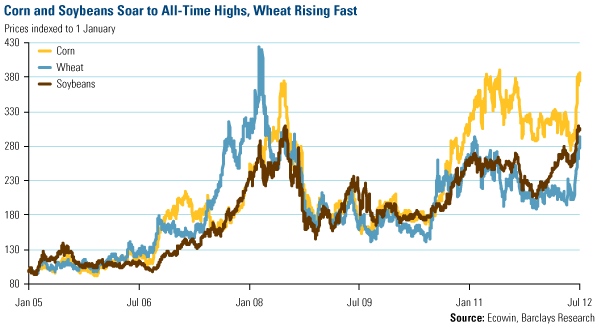Energy and Natural Resources Market Radar (July 23, 2012)

Strengths
- The yield on 10-year U.S. Government Treasury Notes dropped 2 percent from last Friday, closing the day at 1.4576 percent, below the June Consumer Price Index of 1.7 percent. Currently, the average dividend yield of stocks in the Global Resources Fund portfolio is 3.64 percent.
- Bloomberg reported that coal workers have gone on strike at a Glencore mine in Northern Colombia, and output is expected to be cut by half. The workers are demanding higher wages to compensate for the increases seen in production. The National Federation of Coal Producers has forecasted that Colombia, the largest supplier of coal in South America, will increase output by 16 percent this year.
- Copper futures reached their highest level this past Thursday at $3.534 per pound after about two-and-a-half weeks. This came after China’s Premier, Wen Jiabao, commented that China’s employment situation is “severe” and that China will make job creation the number one priority when undertaking plans of economic restructuring.
- OPEC will begin cutting shipments as oil sanctions continue to be imposed upon Iran. Exports are estimated to drop by 0.9 percent per day until August 4 (excluding Angola and Ecuador). Brent increased 4.3 percent through the week before dropping slightly on Friday.
- Clarkson reported that Chinese oil demand is up about 15 percent for this year, 10 percent more than expectations, demonstrating that China’s slowing GDP growth rate does not translate into a slowing energy demand.
Weaknesses
- Rio Tinto is beginning to cut an undisclosed number of jobs at its Clermont mine in Australia due to low thermal coal prices. Output at the Clermont mine was down 200,000 tons year-over-year from January to June.
- Spot iron ore prices dropped to 8-month lows this week, hovering at $125 per metric ton. The last time prices were this low was in November 2011, when iron ore was recovering from a year-low of $116.90 in October. Mining companies such as Anglo American and BHP continue to increase output despite weaker demand from China, which may contribute to a global surplus in 2013, according to Reuters.
- Worldsteel’s June crude steel output data shows that global crude steel output decreased 0.2 percent year-over-year for the first time since January. Western Europe’s output is down 5.3 percent year-over-year, however, second quarter production was up 0.9 percent year-over-year.
Opportunities
- Italy is aiming to attract $18 billion in investment from oil and gas exploration companies in an effort to decrease government expenditure and put an ease to its debt situation. Mario Monti, the Prime Minister of Italy, wants to soften the oil and natural gas exploration ban that was imposed after the Gulf of Mexico spill in 2010. Ninety percent of Italy’s oil and gas demand is currently being imported.
- Codelco is seeking rights to the Junin Deposit in Ecuador that has enough copper and molybdenum reserves to make it a strong competitor with top mining companies in Peru and Chile, two countries that are dominant in the global supply side of these metals. Reuters reported Santiago Yepez, President of Ecuador’s Mining Chamber, as saying that “Junin could be one of the most significant copper deposits in South America.”
- HSBC reported that demand for coking coal is expected to grow by 4 percent per year through 2016. Australia will look to gain from this as it is likely to remain the dominant producer of coking coal through 2030, with control of more than half of the market share.
- Barclays highlighted that the biggest four Chinese banks have increased lending in July, as new loans in the first half of July are double the amount given out in the same period last month. These loans account for about 35 percent to 50 percent of total new loans.
- Clarkson reported that China’s demand for Very Large Crude Carriers (VLCC) has risen 75 percent since 2008. China’s oil demand represents one-fifth of OECD per capita demand, and if that demand increases to Mexico levels (representing 50 percent of OECD per capita demand), China will need 225 new VLCC tankers.
Threats
- Zambia, Africa’s largest coal producer, has proposed a new regulatory act requiring foreign mining companies to place the revenue generated from export sales in local banks for 30 days. Deputy Finance Minister Miles Sampa said this will go into effect within the coming weeks.
- Reforms of increasing nationalism are evident in Bolivia’s recent possession of one of Glencore’s tin and zinc mines. The government wants to take more control over the mining industry. According to Bloomberg, Vice President Garcia Linera said in an interview that “We’re not going to hand our country to foreigners who destroyed Bolivia and left it stagnating for 20 years.”












